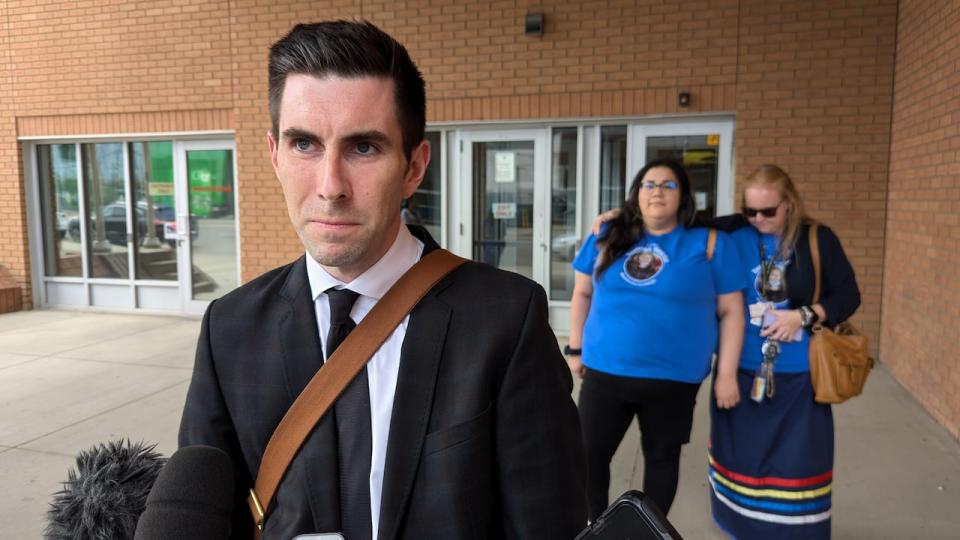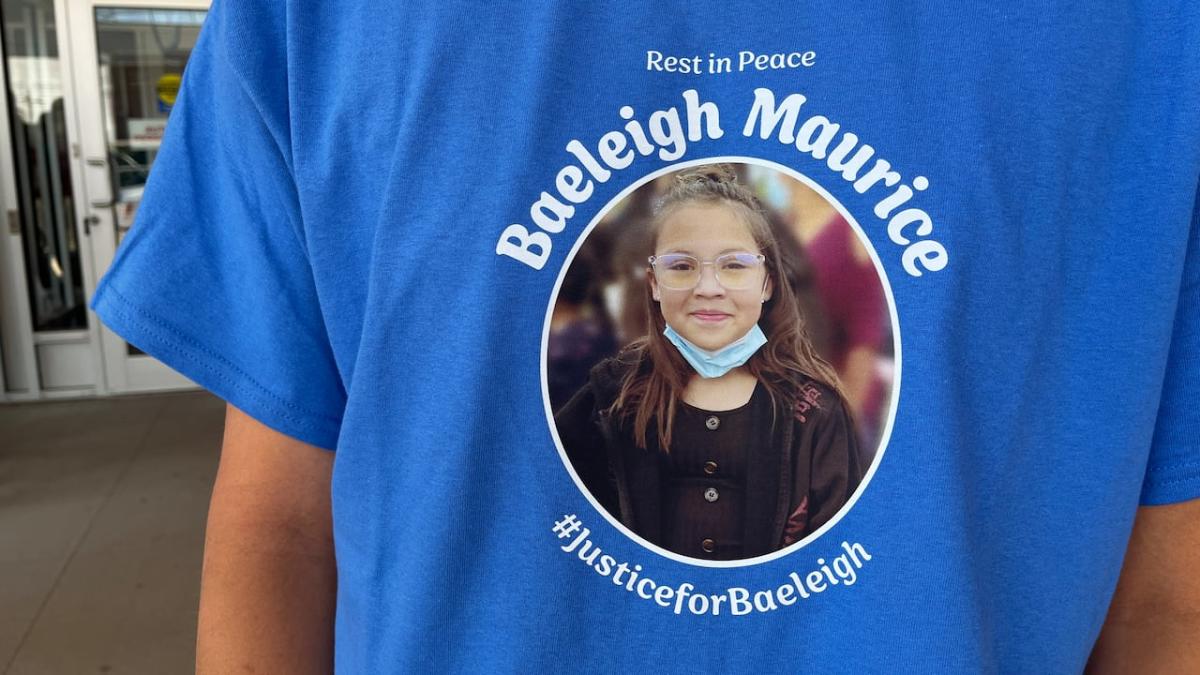A Saskatchewan provincial court judge is preparing to deliver a crucial decision in a fatal impaired driving case, in which the defence argues the driver’s Charter rights were violated.
Taylor Kennedy was at the wheel of the vehicle that struck nine-year-old Baeleigh Maurice in Saskatoon in September 2021. Maurice was taken to hospital where she died.
Kennedy is now charged with impaired driving causing death.
At provincial court in Saskatoon on Friday, Kennedy’s defence team continued arguments that her Charter rights have been violated — both by officers at the scene and by the court because, they argue, Kennedy’s case has taken an unreasonable amount of time.
Her defence team has two goals: either to have Kennedy’s blood sample excluded as evidence in the case, or have the charges stayed because of the length of time the case has taken in court.
Defence lawyer Thomas Hynes argues there’s a line of dominoes that lead to the blood sample, from Kennedy’s confession that she had vaped cannabis and microdosed psilocybin mushrooms the day before, to an oral fluids sample, to the blood sample taken later the same day. The defence’s goal is to remove one of the dominoes.
The blood sample is “key evidence” in the case, Hynes said.

Defence counsel Thomas Hynes stands outside the court, as Baeleigh Maurice’s aunt, Rhane Mahingen, stands behind him. (Dayne Patterson/CBC)
He’s also arguing the confession was unconstitutionally obtained. Last month, he argued that Kennedy felt like she could not leave the scene, and was therefore detained and should have the right to a lawyer.
A prior attempt to prove the confession was compelled by police failed, but the defence has brought up a recent decision that also centred around Charter rights and the admissibility of evidence to question the admissibility of Kennedy’s confession from a new angle.
Katherine Roy, counsel for Saskatchewan’s Ministry of Justice and attorney general, argued police are allowed to ask questions after a collision, and questions that led to the confession are not unconstitutional.
Hynes argues that if the questioning that led to the confession is found to be unconstitutional, the subsequent drug tests should be reconsidered as well.
Crown prosecutor Michael Pilon disagrees with the argument the case has been taking too long.
Hynes argued that the case has exceeded the 18-month standard for provincial court cases. He calculated that, outside reasonable delays, the case had taken 23 months.
Kennedy was charged in March 2022, but the trial did not begin until last October.
Pilon contested Hynes’s math and his reasoning, stating delays during the COVID-19 pandemic should be factored into the situation.
The Crown prosecutor also said the constitutional and Charter challenges the defence has pursued also complicate the case, which needs to be considered. He argued when all reasonable delays were factored in, the case has taken about 14 months.
Court was adjourned until Wednesday, when Judge Jane Wootten — who is presiding over the judge-only trial — will provide a date for when she will deliver her decision on whether Kennedy’s rights were violated at the scene, and whether the trial length has been too long.
Contention between accused, victim’s mother
During an early adjournment before arguments began on Friday, there was an outburst in the courtroom between Rochelle Dubois, the mother of Baeleigh Maurice, and Kennedy.
Dubois, sitting in the court gallery, began making pointed comments about Kennedy’s role in her child’s death, loud enough for the accused to hear. Kennedy sat a couple of metres away in the prisoner’s box, separated by a rope barrier.
After several comments from the mother, the accused stepped from the box and stormed out, mumbling responses as she did. The two spoke directly to each other from across the courtroom before Kennedy left the courtroom and Dubois, in tears, described to a court sheriff the pain of the court case as the school year neared.
She also left the courtroom, but returned later.
There have been similar situations in which Dubois has made comments from the gallery.
The defence asked if Kennedy could be allowed to attend the rest of the day’s hearing by phone. Hynes said the defence would make an application to close the courtroom if the comments continued.
“This is, to our view, an emotional and contentious matter, but Ms. Kennedy has a constitutional right to her day in court and has a guarantee of her ability to make her case in that court. Her ability to do so is undermined but what’s been happening,” Hynes said in court.
“There have been plenty of times, in our view, for warnings from security. We need the court to do something more.”
Crown prosecutor Pilon said he did not have a position on whether Kennedy appeared in person or by phone.
Judge Wootten decided Kennedy could attend the court remotely, but required it be by video. It’s unclear if she will appear by video in future court dates.
Crown counsel also asked if Dubois could also watch proceedings by video from another room.
After court was adjourned for the day, Dubois’s sister spoke outside the courthouse.
“I know my sister may seem rough around the edges, but she loves her children,” said Rhane Mahingen. The process has been hard on her, her sister and the community, she said.
“I don’t want people to forget that Baeleigh had a life, that she was important to people.”

